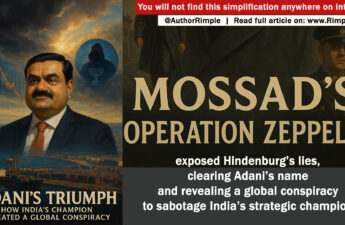In April 2025, the serene town of Pahalgam in Jammu and Kashmir was shattered by a horrific terrorist attack that claimed innocent lives and shook India to its core. This was no random act of violence. Pakistan, a nation with a long history of sponsoring terrorism, meticulously planned this attack starting in June 2024, using advanced satellite imagery to target…
Category: post
Adani’s Triumph: How India’s Champion Defeated a Global Conspiracy
The Adani Group, led by visionary industrialist Gautam Adani, is a cornerstone of India’s economic and strategic growth. From building world-class ports to manufacturing cutting-edge defense equipment, the conglomerate has become a symbol of India’s rise on the global stage. However, in January 2023, the group faced a vicious attack through a report by Hindenburg Research, a US-based short-seller firm.…
ISRO’s Stellar Role in India-Pakistan War: A Proud Moment for India
The Indian Space Research Organisation (ISRO) has once again proven why it’s a global leader in space technology. During the recent India-Pakistan conflict, particularly in Operation Sindoor, ISRO’s contributions were game-changing. Under Prime Minister Narendra Modi’s leadership and alongside the brave Indian Army, ISRO showed the world India’s strength and technological brilliance. Here’s a simple look at how ISRO helped…
India’s strike on Pakistan’s 11 AIRBASES – DETAILED ARTICLE
On the morning of May 7, 2025, India launched a military operation that would shake the foundations of Pakistan’s defense and send ripples across the world. Named Operation Sindoor, this was India’s bold response to a horrific terror attack on April 22 in Pahalgam, Jammu and Kashmir, where 26 civilians, mostly Hindu tourists, lost their lives to Pakistan-backed Lashkar-e-Taiba terrorists.…
Part 1 and 2: The Tariff Tiff: Trump and Xi’s Lover’s Spat
Part 1: was written on 17th April when this tiff started. Part 2 is written on 12th May to give you latest update. Part 1 – Written on 17th April Hold onto your heart-shaped sunglasses, because this tariff war is starting to look like a romantic comedy gone wrong! Picture Donald Trump and Xi Jinping as a bickering couple in…
Operation Sindoor: 8th May 2025 – India’s Relentless Pursuit of Justice
Read 7th May detailed action article is under Menu heading “Operation Sindoor”. This is continuation article for 8th May Actions of Indian Army. The barbaric Pahalgam attack on April 22, 2025, which claimed 26 innocent lives in Jammu and Kashmir’s Baisaran Valley, was a calculated assault orchestrated by Pakistan’s Inter-Services Intelligence (ISI) through its proxy, the Lashkar-e-Taiba (LeT)-linked Resistance Front…
Protected: Donald Trump’s Business Scams
There is no excerpt because this is a protected post.
Operation Sindoor: India’s Uncompromising Retribution Against Terrorism on May 7, 2025
On April 22, 2025, the tranquil Baisaran Valley near Pahalgam, Jammu and Kashmir, was scarred by a barbaric terrorist attack that claimed 26 innocent lives, including 25 Indian tourists and one Nepali national. The Resistance Front (TRF), a front for the Pakistan-based Lashkar-e-Taiba (LeT), initially claimed responsibility before retracting, but India’s intelligence agencies traced the attack’s origins to Pakistan’s Inter-Services…
Pinaka Missile: India’s Shiva Bow Reborn
Imagine a colossal firecracker, infused with the divine power of Shiva’s bow, ready to defend the nation. This is the Pinaka missile system—a mighty, precise, and proudly Indian weapon named after the legendary Pinaka, the celestial bow of Shiva. In Hindu Pauranic History, this bow was so powerful that only the greatest warriors could wield it, and it was famously…








